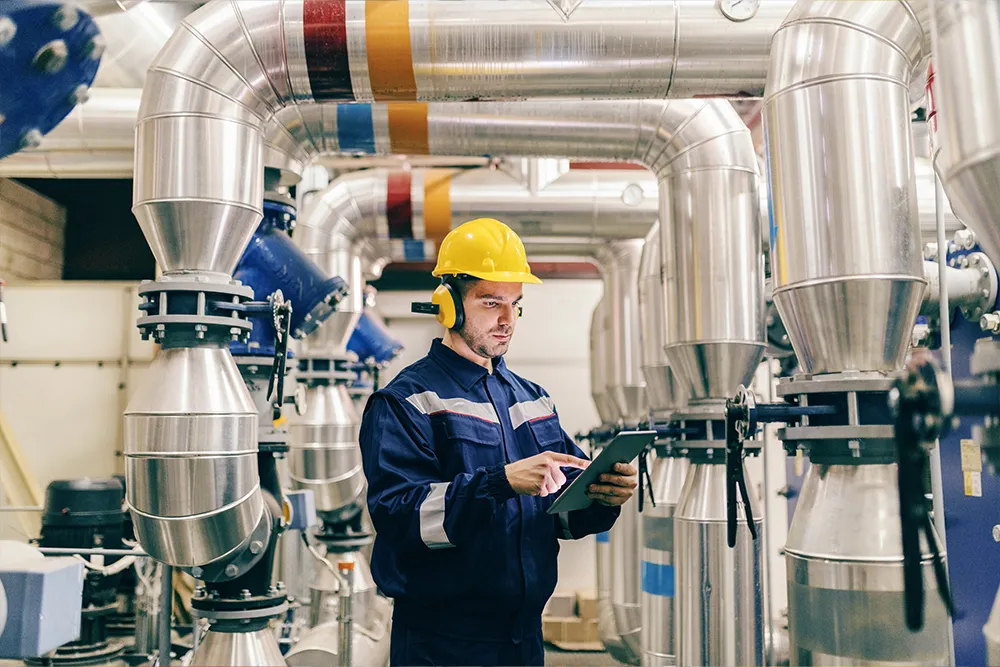Heating systems are vital for the safety and well-being of residents. Therefore, frequent heating inspection must be conducted to function correctly. During these assessments, inspectors use heating system maintenance checklists to thoroughly evaluate the various components of the heater and flag any issues that need attention.
Heating equipment maintenance checklist
Heater inspection using detailed checklists are essential for several reasons. For one, they ensure that needed repairs and servicing are done on time to provide the optimum heating to a household as and when required. These inspections also help homes optimize power consumption. Faulty or clogged heaters can cause disproportionate electricity use and increase power bills significantly. Inspections also help keep maintenance costs in check and ensure the safety of the heating system regardless of the type of heaters installed.
Heating equipment maintenance checklist at a glance
Usually, heaters are electric or may use gas heaters, boilers, and furnaces. Thorough heating system maintenance must begin with the inspection of the essential components of these different systems.
Filter inspection and replacement
Filters may seem like simple components, but they perform a vital task of ensuring air quality. Unfortunately, many inspectors find that many homeowners do not regularly change their air filters. Failure to clean or replace filters when needed can cause them to clog up, resulting in several problems. It can adversely affect the quality of air being circulated, which can pose health risks. It can also put undue strain on the heater and increase power consumption. Changing the air filter not only helps enhance heater performance but can also enhance the life of the heating equipment.
Thermostat inspection, repair, and replacement
Thermostats help measure and regulate heaters for optimum heating. When they do not function properly, there can be a mismatch between the set temperature and the actual temperature in the room. Faulty thermostats can also result in inefficient use of power and cause inconvenience to users. Inspectors check thermostats using multimeters to ensure they have a proper power supply. They test the thermostat by adjusting temperature settings and comparing them with actual room temperatures. Inspectors sometimes set the temperature to the highest or lowest level and check if the heater or AC is triggered accordingly.
Boiler and furnace inspection, repair, and replacement
Boilers can experience problems caused by several factors. Some of these include leaks, accumulated dust, dirt, debris, and air blocks in the piping. These can prevent the boiler from functioning correctly and may even shut them down. Therefore, inspectors typically check valves and safety valves, boiler automation mode settings, fuel levels, water cut-off levels, chimney, refractory burner material, etc., to ensure the boiler parts are all functioning as expected.
Fuel line and fuel tank inspection and repair
The fuel tank and fuel line are vital pieces of the heating infrastructure. Inspectors examine the fuel lines which carry fuel to the burner to ensure the line is free of rust and corrosion. The fuel line must be secure, tightly sealed, and free of dents, cracks, leaks, or damage, which can expose the home to severe risks. The line is either serviced or entirely replaced, depending on the inspection observations. Since this is a highly critical component, the tank, and the line need to be in top working condition, and it is not uncommon for the line to be replaced entirely if it has any wear or functional issues.
Ventilation and radiation inspection and repair
The critical function of the ventilation and radiation components is to circulate warm air through the property evenly and consistently. Radiators gather the steam or water from the boiler and radiate heat through the air. Sometimes radiators can get blocked because of air accumulation. This prevents the steam and moisture from entering it, and it can malfunction. Likewise, when a ventilation system is clogged, it can prevent air circulation through the home. Both these scenarios result in the heater working much harder to achieve the desired ambient temperature putting more stress on the system. This results in more energy consumption, fuel burning, and running costs.
Duct inspection and replacement
Air ducts help circulate heated air across various points in a home. These tubes pass through walls above false ceilings or across other house sections to move air to specific points. These ducts can suffer wear and tear or damage from rodents and, with the resulting ruptures, may distribute heated air in places it is not required. This hearing loss may go undetected unless inspected. When warmed air is lost, and the living areas remain cold, the thermostat regulates the heater to produce more warm air, resulting in massive wastage of energy. Thorough inspections help identify any issues with ducting and prevent inefficiencies in energy utilization.
Central heating system maintenance
Heating systems require comprehensive inspections and maintenance. Inspectors check not only the central heating system but the entire set of components, including ventilation, ducts, thermostat, etc., and validate the heater’s efficiency by checking each endpoint and room where heated air is to be circulated.
Annual HVAC system maintenance
Many homeowners plan annual HVAC audits to ensure their entire system is in good condition. This enables them to identify repairs needed and service components for optimum performance consistently.
Maintenance over repairs
Inspectors use detailed heating inspection checklists to help homeowners lower heater running costs. In addition, effective maintenance routines enable issues to be spotted and fixed early and at a lower cost than if they are discovered at an advanced stage involving massive replacements and repairs.
Streamlined Heater Inspection
Digital inspections conducted using apps like Fielda help inspection teams rapidly collect data and complete the follow-up repairs, serving, and maintenance work needed. Fielda equips inspectors with custom checklists so they can modify them to suit the requirements of different types of heaters. Information captured is instantly available to other teams for immediate action. Through its reports and dashboards, Fielda helps utility service companies seamlessly plan workflow, share information, and review work status from the convenience of their mobile devices.
